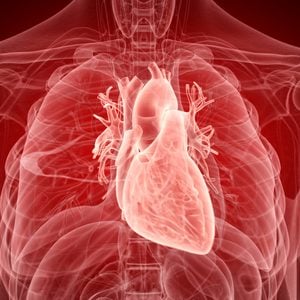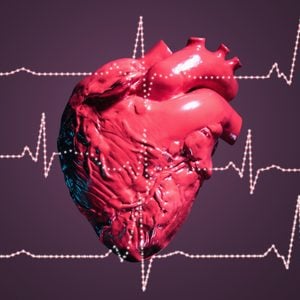11 Surprising Heart Disease Facts You Should Know
Updated: May 18, 2021
Heart disease is the leading cause of death in the U.S., but there are lesser known facts about heart disease that may surprise you.
Heart disease facts
Here’s a fact: Heart disease kills more people worldwide, including in the U.S., than any other cause, according to the Centers for Disease Control and Prevention (CDC). Nearly half of American adults, per a 2019 study in Circulation, have some type of heart disease, and every year, about 805,000 Americans have a heart attack. (Here’s more on how many people die from heart disease each year.)
Yet many of us don’t realize that heart health should be top of mind when it comes to our everyday habits. Heart disease risk factors—up to 80 percent—are largely preventable, says the American Heart Association (AHA).
“Stop smoking, take prescribed medications to manage any chronic conditions, and focus on adding healthy behaviors to your life,” advises Suzanne Steinbaum, MD, attending cardiologist, fellow of the American College of Cardiology and expert for the AHA. (These are the best and the worst heart health diets.)
Here’s a look at some surprising things that can help prevent heart disease, and important heart disease facts you probably didn’t know.
Heart disease isn’t one thing
When people use the term “heart disease,” they typically mean coronary artery disease (more on that later), although technically there are a number of different types of heart diseases and problems that affect the cardiovascular system. (Cardiovascular disease includes heart disease, stroke, high blood pressure, and other problems that affect the heart and blood vessels.)
“Heart disease is any disease of the heart and arteries that interferes with the heart’s ability to pump blood around the body and to deliver nutrients and oxygen to the organs of the body,” says John P. Higgins, MD, a sports cardiologist at McGovern Medical School at UTHealth in Houston.
These different types of heart disease affect the heart in different ways, says Dr. Steinbaum. “There are essentially four parts of the heart, and disease can be seen in each of those areas: the arteries, muscle, valves, and the electric system,” she says. (Learn the signs of an unhealthy heart.)
The most common type of heart disease is coronary artery disease (CAD), in which the major blood vessels to the heart become narrow or blocked with cholesterol and fatty buildup. CAD affects 18.2 million adults, and shockingly, the CDC reports every two in 10 deaths from CAD happen in people under 65 years old. (Also, beware of the silent signs of clogged arteries.)

Women get heart disease—and have worse outcomes
Women may hear a lot about breast cancer, but heart disease kills more women each year than all cancers combined. (Here are heart attack prevention tips every woman should know.)
Although heart disease is often thought of as a man’s disease, women have it, too—and according to a 2018 study in the journal Circulation, more young women 35 to 54 years old are getting it.
The researchers looked at patients hospitalized for a heart attack and found that the percentage of younger people (defined as ages 35 to 54) increased from 27 percent to 32 percent between the late 1990s to the early 2010s. The increase was higher for younger women, who made up 21 percent of the total in 1990-1999 and 31 percent in 2010-2014. The authors also surmised that younger women don’t get the same level of treatment or attention in the emergency room because their symptoms are different from men.
Another gender difference: A 2020 Circulation study found women were at greater risk of dying or developing heart failure (a chronic condition where the heart struggles to pump blood) within five years after a heart attack than men.
Also, heart attack symptoms in women may be subtly different than men. Women may, but not always, have chest pain. They might have lower chest or upper abdomen pressure or pain. Their upper back may hurt, as opposed to generalized back pain in men. They also may have fainting, extreme fatigue, or indigestion, nausea, or vomiting.
Poor sleep can harm your heart
If you don’t get a good night’s sleep, you could be putting your heart at risk. “Patients are amazed at the importance of sleep in this whole equation,” says Courtney Jordan Baechler, MD, a cardiologist, researcher, and medical director of Emerging Science Centers at the Minneapolis Heart Institute Foundation.
“It is a game-changer for people’s ability to have the building blocks to best support their bodies, and that starts with a good night’s rest—otherwise we wake up with inflammation, decreased immunity, and increased stressors on our heart,” she says.
Most adults need six to nine hours of sleep each day.
“Good sleep benefits your whole body, including your heart and brain, allowing your body to rest, fight off illness, manage daily stressors, and stay active during the day,” Dr. Steinbaum says. “Lack of sleep can also increase the risk of heart disease, causing hypertension and obesity,” she says. (Getting good sleep is one of the many heart health tips from cardiologists.)
Heart attacks are more common at certain times of the day, week, and year
Changes in sleep habits, along with some other factors, can cause heart attacks to be more common at certain times of the day, days of the week, and events during the year. These may include “major holidays, because people overindulge in salty fatty food and alcohol, and have reduced sleep, which can raise blood pressure and reduce vascular [blood vessel] function,” Dr. Higgins says.
“Time zone changes or daylight savings adversely affects circadian rhythm,” your body’s internal clock, which can mess up your blood pressure and other body functions as well, he adds. Some other times heart attacks may peak? “Big sporting events, when fans get too stressed and anxious and overindulge,” Dr. Higgins says. “And Mondays, with extra stress after the relaxing weekend,” he adds.
Although a common belief is that morning is the most likely time for sudden cardiac arrest, possibly due to the start of our daily stressors, a 2019 study in Heart Rhythm didn’t observe that to be the case. (Make sure you know these surprising heart attack risks.)
A flu shot can be protective against a heart attack
Having heart disease puts you at greater risk of serious effects of the flu, including having a heart attack, according to the CDC.
“Several studies have found that individuals with heart disease are six to 10 times more likely to have a heart attack following a bout of the flu,” Dr. Steinbaum says.
An October study published in the Annals of Internal Medicine found that 12 percent of adults hospitalized with the flu had sudden, serious heart complications.
“Contracting the flu can result in complications, especially for those with chronic health conditions including heart disease,” Dr. Steinbaum says. She adds, “An annual flu vaccine is a protective tool against influenza, but also an essential preventive management tool for those at higher risk of heart disease and stroke.” (Here’s where you can get a flu shot.)
Racket sports may be particularly good for your heart
One 2016 study published in BMJ found that racket sports like tennis were associated with the lowest reduction in risk of cardiovascular death (56 percent), followed by swimming (41 percent), and aerobics (36 percent). It’s likely because these sports engage your whole body.
But what’s most important when choosing a physical activity to strengthen your heart is to pick one you’re actually going to keep doing.
“All activities are good activities—the best activity to choose is the one that you like, so find an exercise you enjoy and stick with it,” Dr. Steinbaum says. “Consistency and regularity is the most important part of movement, so the activity that you enjoy is the one that you are most likely to stick with. Finding an activity that enables you to increase your heart rate that you can do on a regular and routine basis is the best exercise to choose,” she says.
Getting the recommended amount of physical activity—at least 150 minutes a week of moderate-to-vigorous activity, 75 minutes of vigorous activity, or a combination of both—is linked to lower risk of diseases, stronger bones and muscles, and improved mental health, she says. Tennis is also one of the workouts that burn the most calories.
Sitting is not the new smoking
Let’s get one thing straight: Smoking is not good for your heart. Sitting isn’t necessarily, either. “Sedentary lifestyle can contribute to the increase of plaque in the arteries,” Dr. Steinbaum says.
But some experts now say that saying “sitting is the new smoking” isn’t necessarily accurate, according to a 2018 study in the journal American Journal of Public Health. Although both are unhealthy habits, they aren’t necessarily comparable. Smoking has a higher mortality rate than being sedentary.
Still, you should be aware of how much you sit, and, particularly if you have a desk job or watch a lot of TV, try to sit less.
A 2016 study in The Lancet has also found that physical activity may help counteract all the sitting.
“Start by increasing your movement each day: If you go from not moving at all to walking for five minutes, that’s a bonus,” Dr. Baechler says. “If you can increase to at least 30 minutes of walking a day you are doing great work. That’s going to help your blood pressure, cholesterol, weight, and mental health,” she explains.
Connecting socially can help ward off heart disease
Feeling lonely can actually be a cause of heart disease. “With people who are socially isolated, studies have shown that there is an increased risk of heart disease and stroke, due to both lack of self-care and the significant impact of loneliness that can also increase the stress hormones,” Dr. Steinbaum says. (Here’s how to keep loneliness and isolation from harming your health.)
Those who are engaged socially may also be more likely to get involved in activities that get them moving—and vice versa. “Actual or perceived connectivity improves mood, blood pressure, and amount of exercise,” Dr. Higgins says. And your connectivity may not even need to be of the humankind. “People that walk dogs get around 2,000 extra steps a day,” he says, recommending a furry friend to keep you company.
Mental health affects heart health
Overall, your mental well-being is directly linked to your heart. “Patients are also very surprised that mental health can contribute to up to 30 percent of your overall heart risk,” Dr. Baechler says. “That can be everything from social isolation, anger, or stress to severe depression and other more challenging mental health conditions.”
If you didn’t have enough reasons to treat any mental issues, your heart health is another to consider. Mental health problems can lead to overindulging in unhealthy food or alcohol, affect your sleep, and give you less energy for physical activity. They also might directly cause physiological changes in your body that can lead to a decline in heart health.
“We hope this removes the stigma that can be associated with mental health and encourages everyone to have an action plan in place,” Dr. Baechler says. She adds, “We often talk about our mental health as a muscle or practice that we need to do just like exercise and brushing our teeth.”
Optimism helps your heart
Likewise, a good mental outlook on life can actually cause your physical body to stay healthy.
A 2019 meta-analysis published in JAMA Network Open found an association between a more positive outlook and a 35 percent lower risk for heart disease.
“The data that shows the power of a five to 10-minute practice of gratitude or mindfulness on changing the ‘neuroplasticity’ of our brain is amazing—that is, we can actually teach our brains to be more optimistic, which is helpful for the rest of our body including our heart to function at it’s best, and help lower our blood pressure and fight or flight response,” Dr. Baechler says.
Dr. Higgins suggests some other positivity tools to boost your cardiovascular function.
“Listening to your favorite music 30 minutes a day; and even better if you listen to music while exercising,” he says. Dr. Higgins adds, “Watch a comedy movie or comedy show that will make you laugh. When things go crazy, you can laugh or cry, [so choose to] laugh!”
(Here are some positive thinking quotes to improve your mood and health.)
Coffee is good for you—red wine may be, too
There’s a lot of back and forth on the health benefits of coffee, but research now seems to lean on the side of heart healthy, as long as you don’t add too much sugar or flavorings. “Tea and coffee are packed with [beneficial plant compounds] polyphenols and improve vascular function,” Dr. Higgins says. “Cardiac CT studies have revealed that two to three cups of coffee a day are cardio-protective for most,” he adds.
And what about red wine? Don’t start drinking for your heart if you don’t already, but if you do, Dr. Higgins advises just one glass of red wine a day to potentially reduce cardiovascular disease risk. The link between red wine and lower heart disease is just an association, not cause and effect; and the mechanism isn’t totally known.
Still, Dr. Higgins shared his preferences for potential heart health. “Pinot noir, Sangiovese, malbec [which has the beneficial compounds resveratrol and quercetin], and champagne made with pinot noir and Meunier are the best,” he says.
Next, try these lifesaving tips on how to prevent heart disease.



